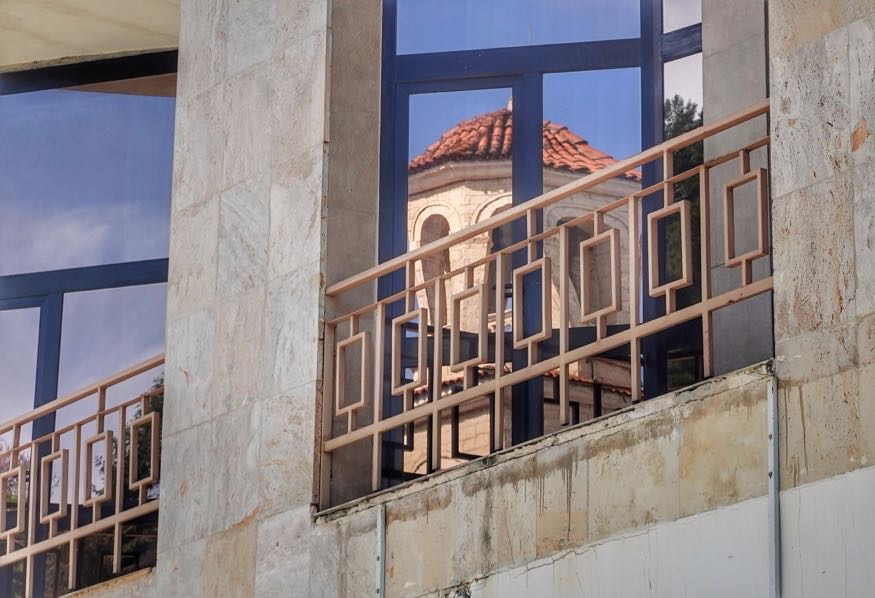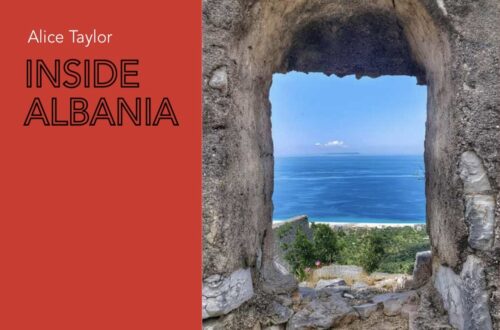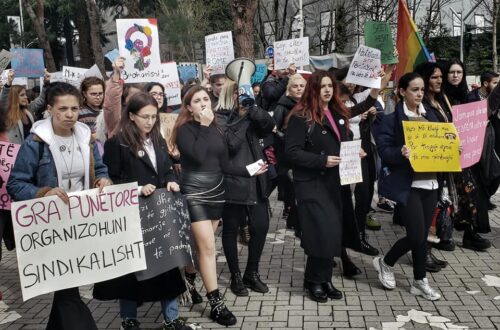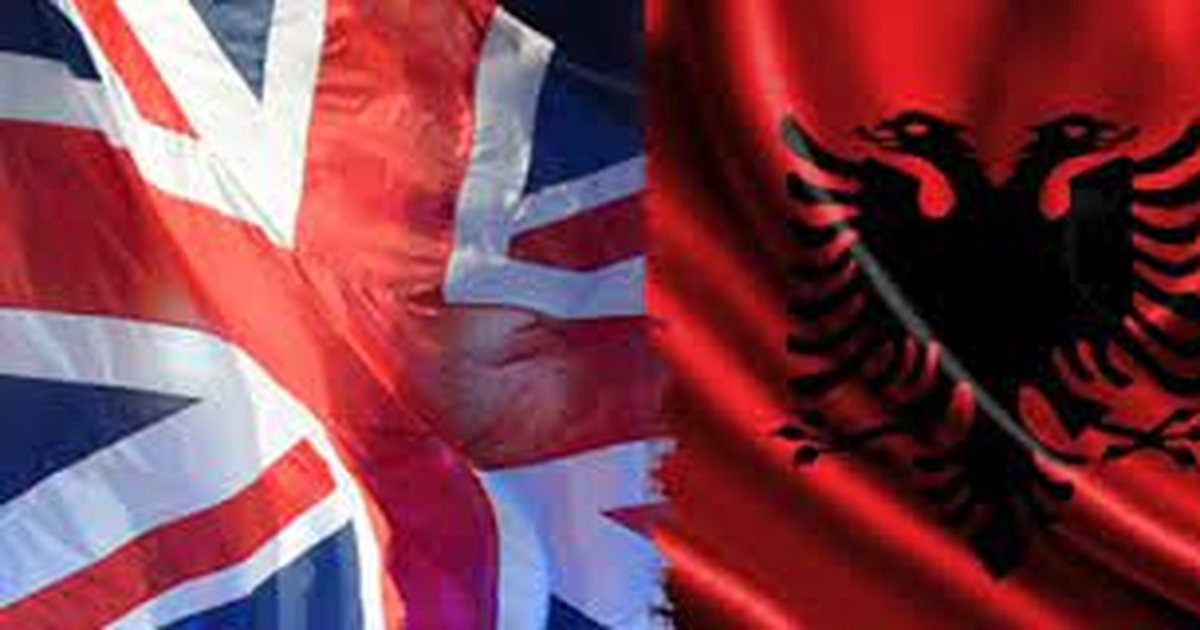Albania is often referred to as a Muslim country, and the recent announcement of the creation of a small, Islamic sovereign state within it did little to dispel this, but the reality behind the EU hopeful’s religious identity is not quite so simple.
The little-known Bektashi faith, with up to 20 million followers and headquarters located just outside Tirana, was catapulted into the international limelight in September when Albanian Prime Minister Edi Rama, an eccentric white trainer-wearing former basketball player and internationally-renowned artist, announced he would create a country-in-a-country just for them.
The leader of this mystic Sufist sect, which allows women and wine in rituals, something frowned upon by ‘mainstream Muslims’, Baba Mondi, told local media that the New York Times story was the first he had heard of it.
Since then, little has been made public about practical plans to turn the small 27-acre Bektashi headquarters into a country with its own green passport. Last week, Rama simply reiterated that it will receive the same special status as Vatican City in Rome and that other religions in the country need not worry, as this is a deserved treatment of a community with its world centre in Albania.
Two weeks ago, Mondi, full name Haxhi Dede Edmond Brahimaj, met with Pope Francis in Rome, with the head of the Catholic church blessing his Bektashi brethren for the “beautiful” initiative.
The news of the Bektashi microstate has made headlines around the world, and when combined with the recent inauguration of the Namazgah Mosque, the largest in the Balkans, right next to parliament, it has further added to the Islamic perception of Albania.
Is it a Muslim country?
But calling the country Muslim, or Muslim majority, will get you into trouble with most Albanians, but it has also caused issues in Brussels. A well-placed EU source told Euronews Albania that specific figures in the EU are against allowing a “Muslim majority” country into the EU, looking in the direction of Albania and Bosnia and Herzegovina.
Another source within the Christian opposition explained that there have been many efforts to “play down” Albania’s Islamic leanings and to make it clear that, first and foremost, Albania is secular.
“All this talk of Islamic micro-states, aside from other descriptions that we are all Muslims, is not going to help our bid to join the EU. We are the most pro-EU country in the region, but that doesn’t matter when it comes to Islamaphobia,” they told me over coffee in central Tirana.
According to the 2023 census, a combination of Sunni, Bektashis and non-denominational Muslims accounted for 51% of the population, a notable decline from 2011.
Christians, including Catholics, Orthodox and Evangelicals, make up 16%, while atheists and other non-religious are around 17%, although the real figure is estimated to be higher.
The results were disputed, and there were reports of people, including myself, not being able to designate themselves as atheists or agnostics during the census.
Historian and author Erald Kapri told Euronews Albania that from the early days of the Albanian state, care was taken to ensure full religious balance and representation in governance, and fundamental constitutional principles enshrined that “Albania does not favour one religion over another.”
Today, the Constitution states, “There is no official religion in Albania,” he added.
But in Albania, the very concept of declaring a religion is not as straightforward as elsewhere.
Albanianism over God
In the early 20th Century, Pashko Vasa, an Albanian poet and figurehead of the Albanian National Awakening movement, declared that Albanians’ religion is Albanianism. Years later, totalitarian communist dictator Enver Hoxha used it as a premise to ban religion and make Albania the first and only completely secular state in the world.
His method of enforcement included burning down mosques and churches, torturing priests before executing them without a trial, and throwing people into gulags to celebrate Christmas or Eid.
In the wake of all religious festivals being banned, all of the sentiment behind them was poured into New Year’s Eve, one of the few celebrations allowed by the regime. Even today, 33 years after the regime fell, the 31 December is the main holiday of the year, the night when Father Christmas comes, when turkeys are slaughtered and devoured en masse, and when children dress up and sing festive songs.
In a recent interview with me, Sali Berisha, Albania’s opposition leader and the first president after the fall of Communism, a Muslim, affirmed that in Albania, religion, politics, faith, and the state are never intertwined.
He added that his party, a member of the largely Christian Democrat European People’s Party, keeps faith separate for the sake of “Albanianness”, adding, “This religious tolerance has kept our nation alive.”
Meanwhile, stereotypes based on a lack of information continue to propagate, with would-be tourists asking on Facebook groups, “Is it ok to wear a bikini on the beach?” and “Is it safe to visit during Ramadan?”
The answer is a resounding yes. Many who claim a religion do not practice it, and I have celebrated a range of religious festivals with Albanians, who have enjoyed plenty of pork and wine during Eid or sweets during Lent.
Kapri told Euronews that Albanians are devout believers, but the communist dictatorship left a legacy of violence against all forms of religion. As a result, in the 1990s, the revival of faith proved challenging due to atheist education and the widespread destruction of places of worship
“Religious indifference stems from the violent communist legacy, which raised several generations of Albanians under atheism,” he said.
Others will tell you that Islam only came to Albania because of the Ottomans, who forced many thousands of Albanians to convert on pain of death, or high taxes. Thus, they reject the label ‘Muslim’ as something imposed upon a nation which was mainly Christian, atheist, and Pagan.
Kapri explains that Albania was initially divided between Orthodox and Catholic due to the dividing line between the Roman Empire and the Byzantine Empire.
By the end of the Middle Ages, Albanian territories were engaged in a prolonged war with the Ottomans, who had established their politics and religion across the Balkans.
During an off-road visit to the village of Berishte, so remote it had no internet or phone signal, I was amazed to meet locals with Orthodox first names and Muslim surnames. When I probed further, a resident explained that centuries ago, they took Islamic names to pacify the Ottomans, retaining their Orthodox forenames to stay true to their beliefs.
Rumour has it that they would even pray in the church in the morning before switching to the mosque in the afternoon.
An example of tolerance?
Albanians are proud of their secular status, and many pride themselves on religious tolerance.
During the Second World War, Albania sheltered some 2000 Jews, giving them Albanian and even Muslim names, and temporarily integrating them within their families and concealing them from the advancing fascist forces. They even allowed them to pray inside mosques, with one in the southern city of Berat still bearing a star of David inside.
This was not a matter of religion but rather besa, part of an ancient feudal code called the Kanun of Lek Dukagjini, which stated that the house of Albanians belonged only to God and the guest. In short, guests must be treated with the utmost respect and protected at all costs, even when it means risking the host’s life.
After the war, Albania was the only country in Europe with more Jews in it then, than before, with not a single Jewish person handed to the enemy.
In 2020, the now deceased Rabbi Finmann, who was a key figure behind the recently inaugurated synagogue and Jewish school in Tirana, told me the Albanians “risked everything to save strangers,” he said. “This is truly remarkable.”
This earned the country much praise from Israel, and Tirana is now home to a Holocaust memorial and a statue of Israeli Prime Minister Shimon Peres. Rruga Hebrenjte (Jew’s Road) remains in Berat, along with a museum dedicated to Jewish history, while in the coastal city of Vlore, the Jewish Quarter has recently been restored.
In Saranda, a stone’s throw from Corfu, there are remains of a synagogue from the 4th century, and there is also evidence of ancient Jewish history in Elbasan and Himare.
Albania’s strong historical links with Israel where further solidified by a silence over atrocities in Gaza and the recent announcement of a direct flight between the two countries in what Rama said would boost tourism and economic cooperation.
But it is not just support for Jews which demonstrates Albania’s openness. Every year, national holidays include Christian and Orthodox Christmas and Easter, Ramadan and two Eids, a handful of Pagan festivals, a few communist leftovers, and Nevruz, celebrated by the Bektashi’s but also considered as Persian New Year.
It is this desire to preserve and protect religious diversity which Rama says is central to his decision.
“This is a call not to let Bektashism melt and disappear…This is the deserved treatment of a community that we cannot let die,” he said.
Follow The Balkanista!




